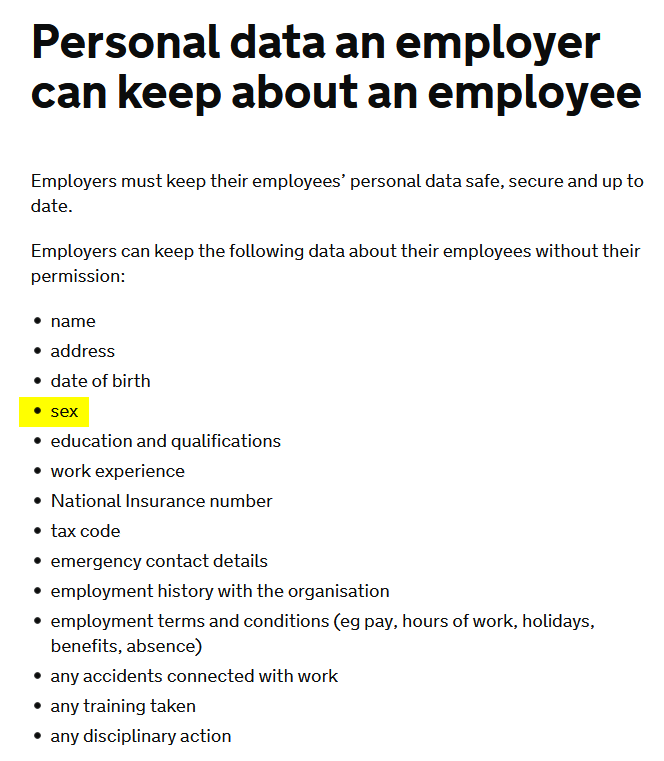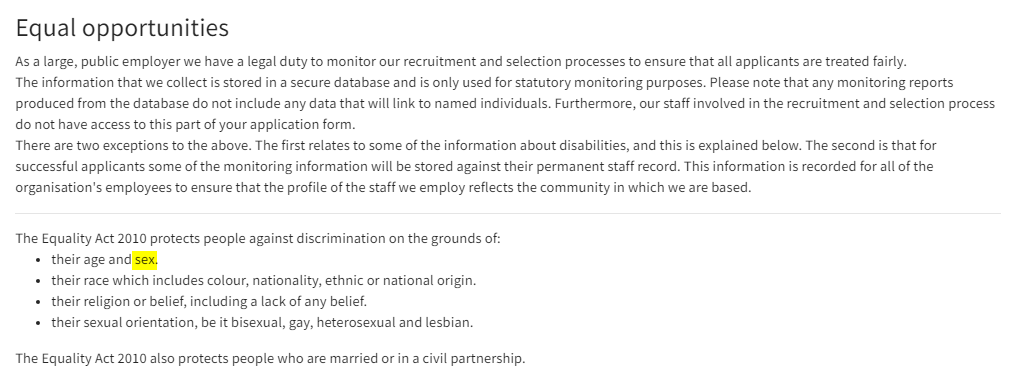
Hi @MagsAssoc @lukerigg @EHRC @EHRCChair @KishwerFalkner @trussliz @GEOgovuk
The Recruitment Pack for your Policy and Research Officer vacancy says your equality and diversity monitoring form is available at magistrates-association.org.uk/About-Us/Work-… but it isn't.
@OllyMann @gilesedwards 1/22
The Recruitment Pack for your Policy and Research Officer vacancy says your equality and diversity monitoring form is available at magistrates-association.org.uk/About-Us/Work-… but it isn't.
@OllyMann @gilesedwards 1/22

However, you have one at magistrates-association.org.uk/Portals/0/MA%2…
As it is a part of your job application process, I assume its purpose is to help you to ensure that you are recruiting without unlawfully discriminating under the Equality Act 2010.
sexnotgender.info/equality-diver… 2/22
As it is a part of your job application process, I assume its purpose is to help you to ensure that you are recruiting without unlawfully discriminating under the Equality Act 2010.
sexnotgender.info/equality-diver… 2/22
I also note the @EHRC guidance on this:
Good equality practice for employers: equality policies, equality training and monitoring
equalityhumanrights.com/sites/default/… 3/22
Good equality practice for employers: equality policies, equality training and monitoring
equalityhumanrights.com/sites/default/… 3/22

It's good to see you have sex listed as a protected chartacteristic under the Equality Act 2010.
However, you then ask for the 'Gender' of the applicant with options:
Male
Female
Non-binary
If you prefer to use your own term, please specify here 4/22
However, you then ask for the 'Gender' of the applicant with options:
Male
Female
Non-binary
If you prefer to use your own term, please specify here 4/22

'Gender' is not a protected characteristic under the Equality Act 2010 and is not defined in the Act.
legislation.gov.uk/ukpga/2010/15/… 5/22
legislation.gov.uk/ukpga/2010/15/… 5/22

Sex is the protected characteristic (as you correctly listed) and the only two possible options for sex are 'Female' and 'Male' as defined in the Act and consistent with biology, but you don't ask for that.
legislation.gov.uk/ukpga/2010/15/…
'Gender' is not a synonym for sex. 6/22
legislation.gov.uk/ukpga/2010/15/…
'Gender' is not a synonym for sex. 6/22

'Non-binary' is not a protected characteristic under the Equality Act 2010 and is not used or defined in the Act. 7/22
See also: ‘Gender’ is not a protected characteristic, admits EHRC
sexnotgender.info/gender-is-not-… 8/22
sexnotgender.info/gender-is-not-… 8/22
You then ask, "Is your gender identity the same as the sex you were assigned at birth?"
'Gender identity' is not a protected characteristic under the Equality Act 2010 and is not used or defined in the Act. 9/22
'Gender identity' is not a protected characteristic under the Equality Act 2010 and is not used or defined in the Act. 9/22

Equating 'gender identity' with sex is meaningless and relies on demeaning, regressive stereotypical notions of societal roles for the two sexes, concepts with which I'm sure you would not wish to be associated. 10/22
Sex is not 'assigned' at birth: sex is observed and recorded and is immutable. 11/22
'Gender' and similar terms rely on demeaning, regressive stereotypical notions of societal roles for the two sexes, concepts with which I'm sure you would not wish to be associated. 12/22
There is a protected characteristic of 'gender reassignment' (as you correctly listed), but it is defined in the Act in terms different to those you use here and you don't ask about this protected characteristic.
legislation.gov.uk/ukpga/2010/15/… 13/22
legislation.gov.uk/ukpga/2010/15/… 13/22

Asking about a personal characteristic such as 'gender' that is not a protected characteristic under the Act, may be in breach of the GDPR by processing personal - and potentially Special Category - data without a lawful basis. 14/22
The Government provides a list of the personal data an employer may hold about an employee without their permission that you might also find useful. 'Gender' does not appear on that list, but sex does.
gov.uk/personal-data-… 15/22
gov.uk/personal-data-… 15/22

If you choose not to gather data on specific protected characteristics (such as sex), you cannot have the information required to ascertain whether or not you could be discriminating on protected characteristics in recruitment. This could be vital in an employment tribunal 16/22
If you choose to discriminate on characteristics (such as 'gender') that are not protected characteristics under the Act, you may inadvertently indirectly discriminate on protected characteristics. 17/22
You might also like to take note of what employment and discrimination Barrister Akua Reindorf said in her report on the @uni_of_essex and in particular Recommendation 18:
cloisters.com/reindorf-revie… 18/22
cloisters.com/reindorf-revie… 18/22

You might like to note what Reindorf also said about the relationship with @stonewalluk in Recommendation 28 of her report. You might also wish to consider the 'benefits and disbenefits' of any relationship with Stonewall. 19/22 

I also note that @trussliz has called for all government departments to withdraw from @Stonewalluk’s 'Diversity Champions' scheme and that the @ehrc and other public bodies have announced they have already left:
thetimes.co.uk/article/a49372… 20/22
thetimes.co.uk/article/a49372… 20/22
Language and meaning of words are important and proper use & understanding of terms is vital so that the public is aware of what rights they have and what your duties are. Any confusion or inconsistency over meaning may prevent people from accessing their rights in law. 21/22
Will you undertake to correct these errors and to review all your other policies, documents, reports, etc to ensure compliance?
Please respond.
sexnotgender.info/list
@threadreaderapp unroll 22/22
Please respond.
sexnotgender.info/list
@threadreaderapp unroll 22/22
• • •
Missing some Tweet in this thread? You can try to
force a refresh














